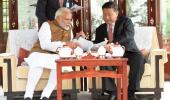India on Wednesday took strong exception to China claiming sovereignty over the Galwan Valley in eastern Ladakh, saying its "exaggerated and untenable claims" are contrary to the understanding reached on the issue between the two sides.

Ministry of external affairs spokesperson Anurag Srivastava's response came after China claimed that the Galwan Valley in eastern Ladakh is a part of its territory.
"As we have conveyed earlier today, the external affairs minister and the state councillor and foreign minister of China had a phone conversation on recent developments in Ladakh," Srivastava said late Wednesday night.
"Both sides have agreed that the overall situation should be handled in a responsible manner and that the understandings reached between Senior Commanders on 6th June should be implemented sincerely. Making exaggerated and untenable claims is contrary to this understanding," he said.
Earlier on Wednesday, India delivered a strong message to China that the "unprecedented" incident in the Galwan Valley will have a "serious impact" on the bilateral relationship and held the "pre-meditated" action by Chinese army directly responsible for the violence that left 20 Indian Army personnel dead.
In a telephonic conversation, external affairs minister Jaishankar conveyed to his Chinese counterpart Wang Wi India's protest in the "strongest terms" and said the Chinese side should reassess its actions and take corrective steps, the ministry of external affairs said.
The Chinese foreign ministry, in a statement, said the two sides agreed to "cool down the situation on the ground as soon as possible", and maintain peace and tranquillity in the border area in accordance with the agreement reached so far between the two countries.
The clash in Galwan Valley on Monday night is the biggest confrontation between the two militaries after their 1967 clashes in Nathu La in 1967 when India lost around 80 soldiers while over 300 Chinese army personnel were killed.
The India-China border dispute covers the 3,488-km-long LAC. China claims Arunachal Pradesh as part of southern Tibet, while India contests it.
Prior to the clashes, both sides have been asserting that pending the final resolution of the boundary issue, it is necessary to maintain peace and tranquillity in the border areas.











 © 2025
© 2025